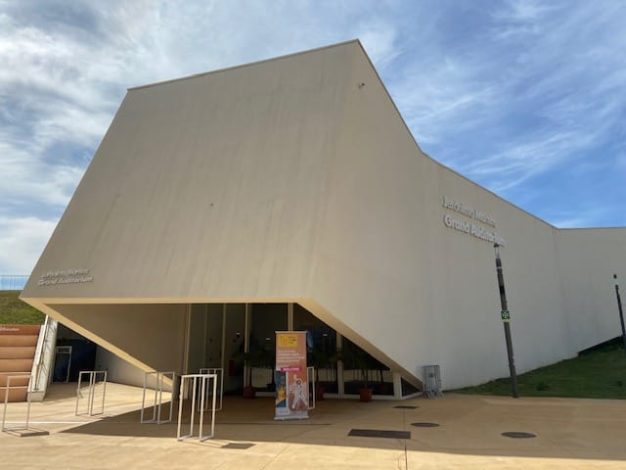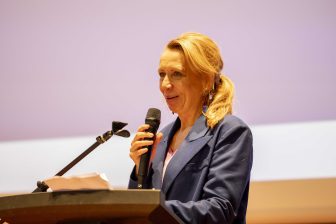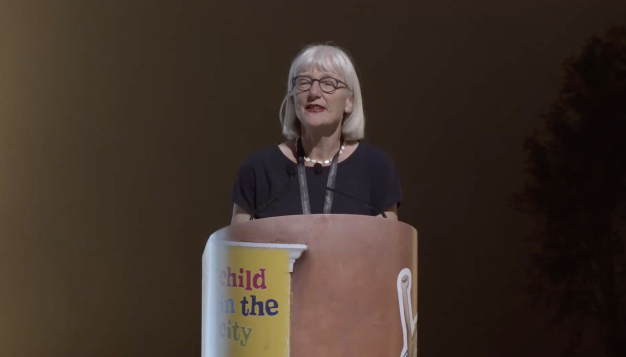
‘I cannot tell you how glad I am that we are all united here today’ – Cascais 2022
The Portugese city of Cascais has finally been able to roll out the red carpet for Child in the City International Seminar 2022.
Two days of fascinating, thought-provoking debate and knowledge-sharing were on the agenda for this important gathering of child rights experts and champions.
A trio of keynote speeches bookended a series of interactive workshops, where delegates heard from experts and, in turn, shared some of their own experiences about how to involve children in mainstream urban planning policies.
Professor Lia Karsten (main photo), president of the Scientific Program Committee of the Child in the City Foundation, kicked off proceedings by welcoming delegates to Cascais.
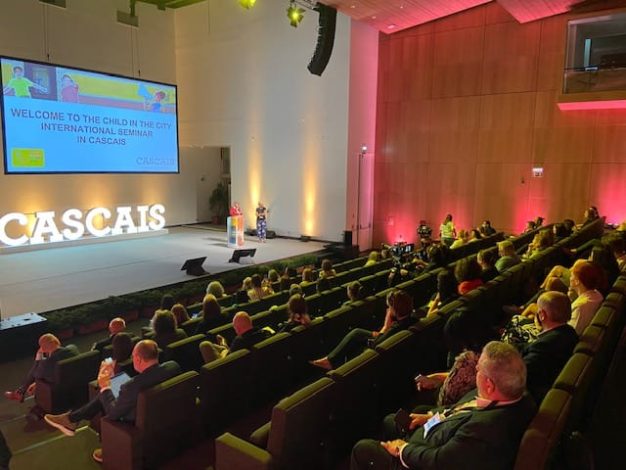
“I cannot tell you how glad I am that we are all united here today,” said Lia, reflecting the thoughts of everyone after a difficult two years of pandemic-enforced closures and cancellations.
‘I am really proud of all the knowledge we have brought here’
One of the key aims of Cascais 2022 was, she said, to ‘facilitate the exchange of good practices’ around children’s rights’. “I am really proud of all the knowledge we have brought together…we hope to strengthen children’s and families’ lives,” she added.
Lia then gave the floor to Carla Semedo (below), a Cascais city councillor, who said that the promotion of children’s rights ‘allows us to tackle inequalities’, and also to work towards ‘the dream of a happier, more ‘smiley’ future for children’.
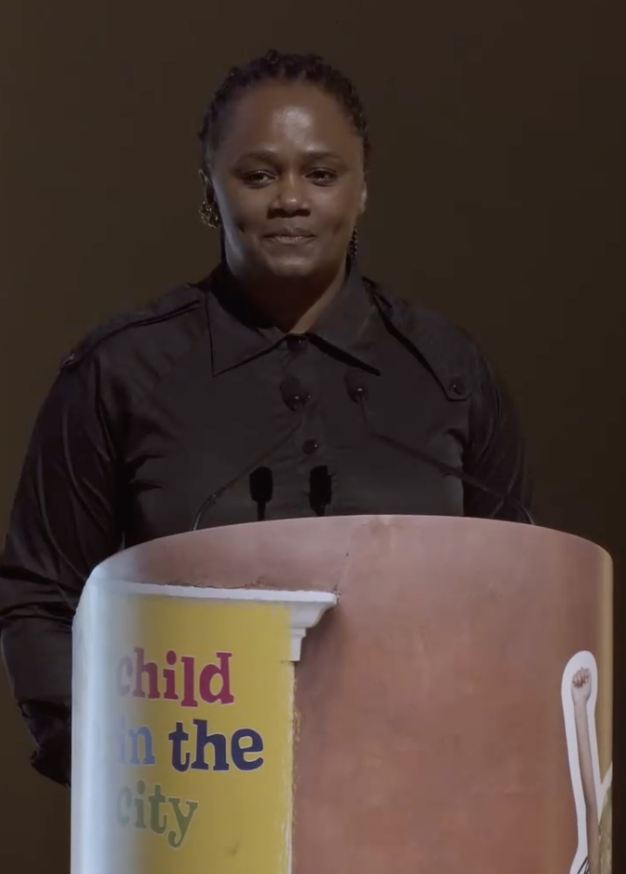
“We need to foresee and protect the rights of children…we know that their well-being is a continual challenge (and) we want to continue being a city that is more child-friendly,” she added.
Arie van Dijk, of ProMedia Group, which operates Child in the City on behalf of the Foundation, then gave a brief overview of operations, before the first keynote speaker, Regula Flisch (below), took to the podium.
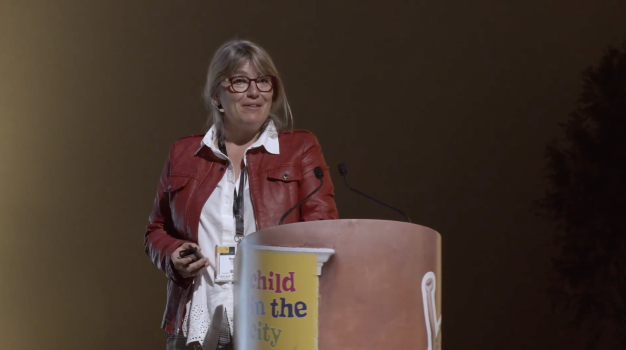
As Head of the Center for Executive Education at the University of Applied Sciences of Eastern Switzerland, Regula has been leading a team which has developed the ‘kinderrecht’ app, which is helping ensure children are better informed about their rights and know how to exercise them.
‘It is about empowerment’
She explained about how the various processes for producing, developing and tweaking the app have, at all times, been carried out with the thoughts of children themselves in mind. “We are the adults but it is the children that have to use the app,” she said.
“It’s not only about the knowledge, but also about empowerment,” she said, adding that they had held five workshops across Switzerland in order to ensure solid feedback from potential users, taking note of any accessibility concerns.
“We had to think about feedback from children, so we created a children’s advisory board…this was a very good idea,” added Regula. The hope is that the app can finally be in use by March 2023.
The day also saw a host of parallel ‘breakout’ sessions taking place, where delegates could choose from several themed options. These sessions took place with the following speakers:
- Session A, Children’s and young people’s participation as a tool to establish their rights, with Deborah Ralls, Mario Bellinzona, Associazone LAQUP and Lisa Wilderink
- Session B, Children’s rights in the field of education and child care in times of corona, with Anna Teresa Brito, Ana Lourenco and Marie Eve Joret
- Session C, The implementation of children’s rights in urban planning, development and design, with Gisela Barbosa, Anna Schledorn, Rianne Janssens, Helen Lynch, Maria Prelltwitz and Alexandra Olofsson
- Session D, The implementation of children’s rights in urban planning, development and design, with Özlemnur Ataol and Gabriele Trevisan
- Session E, Children’s and young people’s participation as a tool to establish children’s rights, with Marica Nutte, Luis Manuel Pinto and Anita Paza
- Session F, Critical reflections on the framework of United Nations Convention on the Rights of the Child, with Mona Meienberg, Tobias Kindler, Sybille Gloor, Kristine Nauditt and Aigerim Mussabalinova.
Next up was Manuel Sarmento, Associate Professor of Aggregation at the University of Minho in Portugal. He began his presentation, ‘Children’s rights in the construction of local public policies for childhood (in times of pandemic)’, by reflecting on how the ongoing conflict in Ukraine brought policymaking into even sharper focus.
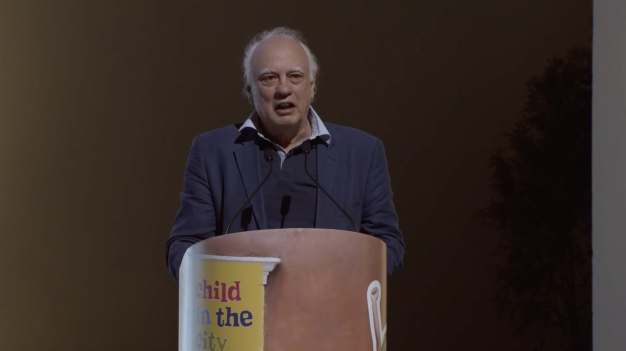
He touched on some of the many logistical problems faced during the pandemic, such as the ‘invisibility’ of children and being confined for long periods. “We did not hear the scooters or the skates,” he added.
‘Give the streets and cities back to children’
Manuel went on to describe how pandemic had ‘highlighted the importance of local public policies for childhood, based on an ethic of care, but competent enough to be conducted from an intergenerational perspective’.
The final keynote speaker of day one was Professor Carlo Neto, from the Faculty of Human Kinetics at the University of Lisbon, with his presentation ‘Corona and its effect on children’s everyday life, play and movement’.
Viewing events through the prism of the pandemic, he said that ‘in times of adversity and uncertainty’, it remained a ‘fundamental right’ to ‘give back to children the street and the city so they can play and be active’.
Many cities, he added, had changed their philosophy to a ‘participatory urban planning’ which accounts for new needs in terms of the physical and mental health and well-being of children and young people.
‘Reinventing the streets and cities of the future’ for children should, he said, be considered in line with ‘childhood cultures’, including aesthetic dignity and opportunities for action.
Day two was due to host a series of field trips across the Cascais city and surrounding area, giving delegates the chance to see a variety of child-friendly projects in operation, and discover more about how the city implements its own child-friendly policies.
Also lined up were more parallel sessions, before the afternoon session’s fourth and final keynote of the conference, by Danielle Ben-Attar, Israel Representative of the Bernard van Leer Foundation.
Follow the event and debate on social media – tweet us @childinthecity1 or by using the hashtag #childcascais2022
